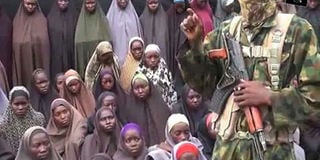Breaking News: At least 10 feared to have drowned in Makueni river
Nigerian police seek three suspects after release of Chibok girls video

This video grab image created on August 14, 2016 taken from a video released on YouTube purportedly by Islamist group Boko Haram showing what is claimed to be one of the groups fighters at an undisclosed location standing in front of girls allegedly kidnapped from Chibok in April 2014. PHOTO | AFP
What you need to know:
- Colonel Sani Usman told AFP that local journalist Ahmad Salkida had been in contact with the Islamists, as had Ahmed Bolori and Aisha Wakil.
- Authorities also want to talk to the suspects over a recent video released by Boko Haram on the girls.
- On Sunday, Boko Haram released a video of the Chibok girls, showing some who are still alive and claiming that others died in air strikes.
- A father of one of the girls still missing said he recognised his daughter in the video.
LAGOS, Monday
Nigeria’s army has declared three people, including a journalist, wanted for allegedly concealing information on more than 200 girls abducted from their school in Chibok in April 2014, a spokesman said on Monday.
Colonel Sani Usman told AFP that local journalist Ahmad Salkida had been in contact with the Islamists, as had Ahmed Bolori and Aisha Wakil.
“There is no doubt that these individuals have links with Boko Haram terrorists and have contacts with them,” he said.
“They must therefore come forward and tell us where the group is keeping the Chibok girls and other abducted persons to enable us rescue them.”
Col Usman said the military would work with other security agencies to bring in the suspects “if they fail to turn up”.
He added that authorities also want to talk to the suspects over a recent video released by Boko Haram on the girls.
Mr Salkida is said to have high-level contacts among the group’s leaders and is believed to have been involved in failed talks between Boko Haram and the government of former president Goodluck Jonathan.
On Sunday, Boko Haram released a video of the Chibok girls, showing some who are still alive and claiming that others died in air strikes.
The video was the latest release from Boko Haram’s embattled leader Abubakar Shekau, who this month denied claims that he has been replaced as the leader of the jihadist group.
The video demanded the release of Boko Haram fighters held by the government in exchange for the kidnapped schoolgirls. The government said it was studying the footage.
A father of one of the girls still missing said he recognised his daughter in the video, as a spokesman for the Bring Back Our Girls movement said he was “certain” of the identities of 10 other girls seen in the footage.
The Nigerian government said it was in touch with those claiming to be behind the undated video, which shows a group of approximately 50 girls in Islamic dress sitting and standing around a masked man armed with an assault rifle.
A man wearing camouflage gear in the video called on the government to release Boko Haram fighters in exchange for the girls. “They should immediately release our brethren in their custody,” the man said, warning that if the prisoners were not released the government would never be able to rescue the girls.
“They should know that their children are still in our hands,” he said in the video posted on YouTube that appeared to show some women injured after an air strike.
TECHNICALLY DEFEATED
While President Muhammadu Buhari has said the group is “technically defeated”, his government has struggled to find the girls, an enduring political embarrassment that highlights Boko Haram’s continued presence in the region.
The mass kidnapping of schoolgirls from the remote town of Chibok provoked global outrage and brought unprecedented attention to Boko Haram and its bloody quest to create a fundamentalist state in northeastern Nigeria.
The new video was attributed to the original Boko Haram name, not the new Islamic State West Africa Province (ISWAP), suggesting it was released by Shekau’s faction, although it is not known when or where it was filmed.
“There are a number of the girls, about 40 of them, that have been married,” said the man in the 11-minute video. “Some of them have died as a result of aerial bombardment.”
A girl who gave her name as Maida Yakubu speaks in the Chibok dialect and chokes back tears as she describes an air strike by Nigerian armed forces.
In the background, several girls look visibly distressed and dab their eyes. One is holding a small baby. “When I heard her voice, I realised she is my daughter,” her father Kanu Yakubu told reporters in Abuja.
“We’re certain that these are the Chibok girls,” Bring Back Our Girls spokesman Abubakar Abdullahi told AFP.
“We recognise up to 10 from the video,” Abdullahi said, adding that he was waiting for confirmation from the Nigerian government and parents of the girls before releasing more names.





